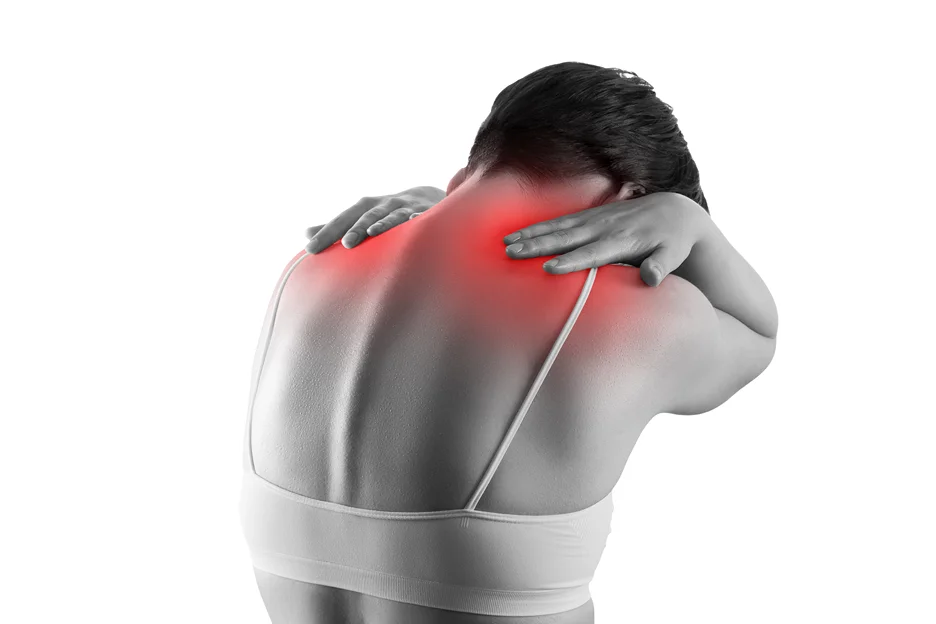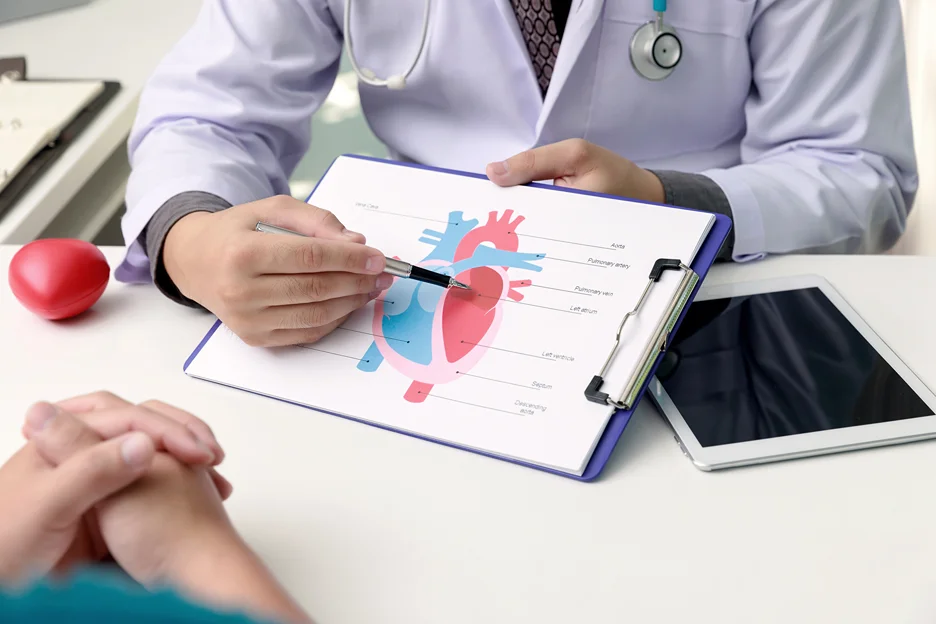Back pain plus other red flags could equal heart trouble ahead – discover the connection.
Think twice before popping a painkiller for that stubborn back pain – it could be a stealth heart attack in disguise. Don’t mask potentially life-saving symptoms without learning what’s really causing them.
Recognize the signs and respond promptly to safeguard your heart. Kaly’s experts will answer all the pertinent questions related to back pain and cardiovascular events for your peace of mind and added knowledge.
What is the Connection Between Back Pain and Heart Attacks?

Back pain can be a symptom of a heart attack due to referred pain from shared nerve connections between the heart and back; this is more common in women, who tend to have atypical heart attack symptoms.
Referred Pain Explained
According to our experience at Kaly, back pain can serve as a warning sign of an impending heart attack, especially in women. This referred pain stems from the intricate network of sensory nerves connecting the heart to the back and surrounding areas.
When the heart’s blood flow becomes blocked during a heart attack, it can irritate these nerves and cause pain signals to radiate to the upper back.
Kaly specialists explain that the exact mechanism behind referred back pain is complex, but likely involves the shared nerve connections between the heart and back. While not fully understood, the linkage is well documented.
It’s More Common in Women
Our experts advise that women in particular tend to experience atypical signs of a heart attack like upper back pain more often than men. Women may also have pain in the jaw, shoulders, or arm that can be overlooked or misdiagnosed.
This is proven by a 2021 study that analyzed differences in heart attack symptoms between men and women. It found women more commonly experience “atypical” symptoms like back pain rather than the typical chest pain.
Kaly encourages women not to downplay new back pain as just a pulled muscle. Seek medical care promptly, as early treatment is critical.
The Role of Chronic Back Conditions
Some studies suggest chronic back conditions like spinal stenosis may increase future cardiovascular risk.
However, Kaly experts emphasize acute, unexplained back pain as a more immediate red flag for an imminent heart attack needing emergency care.
Don’t risk it – search heart specialists on Kaly to decode concerning back pain now.
What Does Back Pain from a Heart Attack Feel Like?

Back pain from a heart attack may feel like sudden, burning, or pressure sensations in the upper back between the shoulders that persist for over a few minutes or come and go; it often occurs with other symptoms like chest pain.
Where You Feel It
- The pain is often described as a burning, tingling, or pressure sensation in the upper back between the shoulder blades.
- It may also be felt in the lower back or radiate to other areas like the jaws, shoulders, arms, or neck.
Onset and Duration
- The pain tends to come on suddenly, without any preceding injury or physical exertion.
- It usually persists continuously for more than just a few minutes.
- The pain may also come and go in waves, varying in severity.
- It could wake you up from sleep or come on even at rest.
Accompanying Symptoms
- Chest tightness or pressure
- Shortness of breath
- Nausea
- Lightheadedness
- Pain in the jaws, shoulders, or arms
Where is the Location of Back Pain During a Heart Attack?
Back pain experienced during a heart attack is most often located in the upper back between the shoulder blades or at the top of the back. The pain may also radiate to the neck, jaws, shoulders, or arms.
Based on our experience, the back pain may feel like a sudden, intense sensation or tight squeezing in the upper back. Some describe it as a feeling of ropes being tied around the chest and back. The pain can also manifest as more of a dull or aching discomfort.
Kaly cardiologists advise that other common heart attack symptoms like shortness of breath, nausea, sweating, and pain radiating to the jaws, arms, or neck often accompany the back pain.
Can Heart Problems Lead to Back Pain?

People with chronic back pain often have higher rates of cardiovascular disease like heart attacks, angina, and arrhythmias compared to the general population.
Proposed mechanisms include increased sympathetic nervous system activity from ongoing pain, which may raise cardiovascular risk over time.
Older adults with spinal stenosis frequently have abnormal protein deposits associated with a type of heart failure called transthyretin amyloid cardiomyopathy, as proven by this Columbia University study. This indicates the importance of screening spinal stenosis patients for this condition.
Back Pain Severity and Mortality
Multiple studies show an association between worsening chronic back pain and increased mortality rates from coronary artery disease.
While more research is needed, persistent back pain should prompt evaluation of cardiovascular health.
Worsening of Existing Back Pain
Underlying heart conditions like congestive heart failure may worsen pain, fatigue, depression, and disability in those already suffering from back problems.
Tap Kaly to get answers from cardiologists about any unexplained back or jaw pain now.
FAQs
Are upper back pain and heart problems related?
Yes, upper back pain can be a sign of a heart problem, especially in women. The pain is referred from the heart due to shared nerves.
Can back pain cause heart problems?
No, back pain itself does not cause heart problems. However, it can be a symptom of an underlying heart condition.
Is back pain a possible symptom of heart problems?
Yes, back pain, especially upper back pain, can be a symptom of various heart problems like a heart attack, angina, or heart failure. The pain is referred from the heart.
Can heart problems lead to back pain?
Yes, heart conditions like a heart attack, angina, pericarditis, or aortic aneurysms can cause back pain due to shared nerves between the heart and back or inflammation spreading to the back.
Is back pain a symptom of heart failure?
Yes, about 26% of patients with heart failure experience back pain. This is due to inflammation and fluid buildup caused by the heart’s reduced pumping ability.
Is pain between the shoulder blades a sign of a heart attack?
Yes, pain between the shoulder blades can be a sign of a heart attack, especially in women. Doctors call this referred pain from the heart.
Can mid back pain be a symptom of a heart attack?
Yes, middle back pain can be a symptom of a heart attack. The nerves from the heart connect with nerves in the middle back area, causing referred pain.
Is lower back pain a sign of a heart attack?
No, lower back pain is rarely associated directly with a heart attack. But it can indicate heart problems like aortic aneurysms or heart failure.
Is middle back pain a sign of a heart attack?
Yes, middle back pain can be a referred pain symptom of a heart attack. The brain has trouble pinpointing the origin of heart-related pain.
Is left-sided back pain common during a heart attack?
Yes, left-sided back pain is more common during a heart attack since the nerves connecting the heart and back are usually on the left side.
Can a heart attack cause pain in both the back and jaw?
Yes, a heart attack often causes referred pain in multiple areas like the back and jaw at the same time due to shared nerves with the heart.
